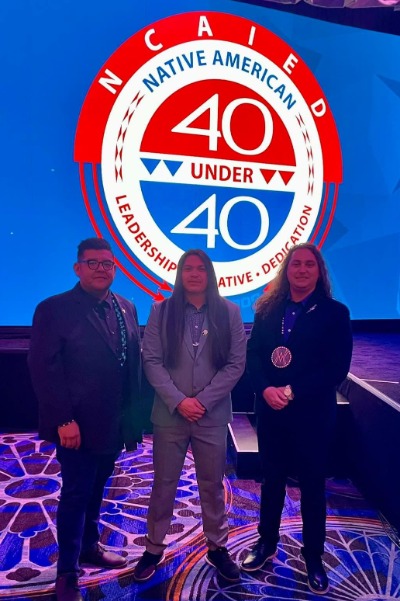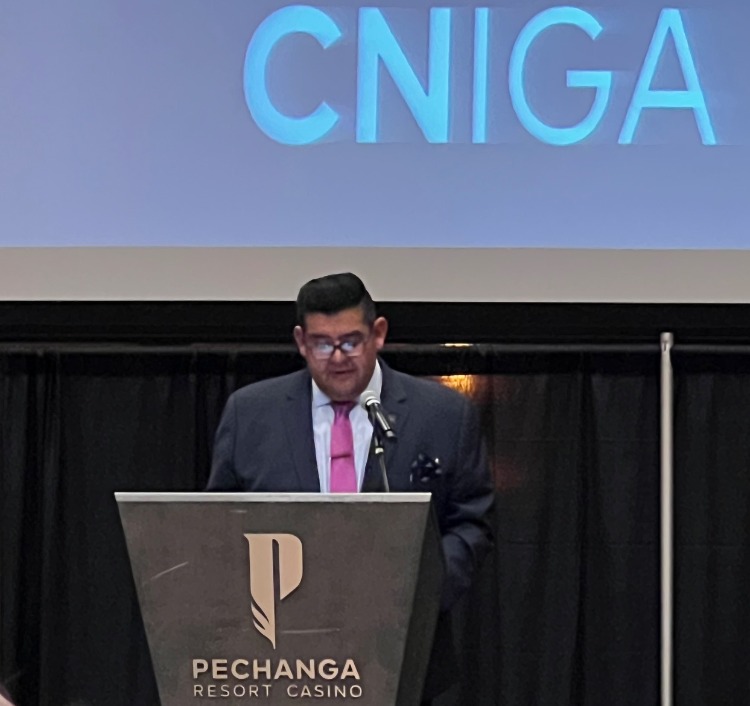
James Siva just wants everyone to get along. As the man who held together the disparate group of tribes that make up the California Nations Indian Gaming Association (CNIGA) when not one but two commercial groups tried to take the lead in betting in California, he seems to have a knack available for negotiations.
“I think James has a unique ability to be a leader and listen to different sides of everything. “It gives tribal leadership a chance to hear both sides and come to a compromise,” Tuolumne Band of Me-Wuk Indians Tribal Council member Dennis Hendricks said.
Siva said Hendricks was a mentor when he first joined the CNIGA Executive Committee.
Siva, the current CNIGA chairman, hopes this is the kind of leadership the Indian Gaming Association (IGA), which meets in Anaheim starting Monday (April 8), is looking for. Siva announced his intention to run for the post of vice-chairman of the Western Indian Gaming Conference in February. He will face incumbent David Z. Bean of the Puyallup Tribe in Washington.
Young minds want to rise
Siva is one of two young tribal leaders named to the National Center for American Indian Enterprise Development’s “40 Under 40” list of emerging tribal leaders this year and is running for national office.
The other is Justin Barrett, treasurer of the East Shawnee Tribe in Oklahoma. He will likely face incumbent Treasurer Andy Ebona of Douglas Village, Alaska. Together, Siva and Barrett would bring representatives from the two largest tribal gaming states in the United States onto the IGA Executive Committee. Neither California nor Oklahoma currently has a vote on the board.
The IGA elections will take place on April 9, the second day of the annual conference. Those wishing to run for office must be nominated that day, then regional factions meet to determine who they will support, and then delegates vote. Every member base – no matter how large or small – is entitled to one delegate and one vote.
Time for a change?
Siva and Barrett are both running in hopes of bringing about change.
“I feel a certain level of complacency has crept into IGA over the last five to 10 years,” Siva said. “I think at this level it’s not surprising that things get a little repetitive. There are the same types of conferences, the same types of lobbying efforts in DC, it’s being criticized by tribes across the country.”
Siva said the IGA, which advocates on tribal issues in Washington, D.C., requires unanimity before it can take a clear position on an issue. As chairman of CNIGA — a coalition of 52 tribes in California — it’s hard to reach complete agreement on certain issues, so Siva had to start thinking outside the box.
“We really had to think about what unity of purpose means,” he said. “Unity, based on complete consensus, makes any action unattainable. But you have to agree on the principles. We had to nail down our core beliefs and then we can disagree but move on.”
Respect is crucial to the unity of the CNIGA
One of the most recent examples came in 2022, when a group of seven commercial operators pushed a ballot initiative to bring online sports betting to California. In the end, Indian Country resisted the initiative and killed them.
But along the way, three tribes – the Big Valley Band of Pomo Indians, the Middletown Rancheria of the Pomo Indians and the Santa Rosa Rancheria Tachi Yokut Tribe – have all committed to supporting Proposition 27, the commercial initiative, because they believed that this would be a step towards financial independence and would help them maintain their sovereignty.

Most of the rest of the CNIGA disagreed, but Siva and his board did not shun or reject the tribes.
“They came to all our meetings and were treated with respect,” Siva said. “And they shared their thoughts. We needed to be able to identify our shortcomings so that these tribes wouldn’t have a hard time turning to commercial operators for help.”
Hendricks said: “It has been a difficult time and the CNIGA’s job is to protect the sovereign right to gamble on our land. When someone takes the other side, it hurts some people. We have worked for tribal unity for a long time, and it was painful, but now that we have achieved it, even if we disagreed with their statements or concerns, they are still part of our group, and we respect what they say have to do say.”
Shiva’s goal: to listen to everyone
As California Indian Country recovered from that divide, another business group put forward another plan for a ballot initiative in 2023. This time Siva and CNIGA were strongly against it.
The group abandoned its plan, giving the state’s tribes a chance to mend fences within their larger community and determine what legal sports betting and, eventually, online casinos will look like in the nation’s largest state.
“I’m trying to advocate and create a space where everyone has a seat at the table and can share their decision,” Siva said. “I want to grow our industry, promote tribal exclusivity and defend tribal sovereignty. I think I can bring this to the national stage.”
Siva was elected Chair of CNIGA in 2020 after serving as Vice Chair and Member at Large. He is also vice chairman of the Morongo Band of Mission Indians, where he previously served as a tribal council member. Siva says he stumbled into tribal leadership but found it was his calling.
“This is the first thing I’ve done that really ticked all the boxes for me,” Siva said. “I can still do some academic work, like working on legislative and policy stuff. I have always felt very comfortable and thrived as a public speaker. And I’ve always been a people person.”
Kindred soul?
Twelve hundred miles east, Siva has found something of a soul mate. Barrett, who just turned 30, is the youngest tribal board member in East Shawnee history, and if he wins his bid for IGA treasurer, he will appear to be the youngest ever to do so. Barrett said his family has long been involved in tribal leadership and politics, so this was a natural fit for him.
Barrett and Siva are part of a group putting together the new Tribal Leadership Council, which aims to give young tribal leaders the tools to succeed. The idea came about, Barrett said, through a conversation between him and California Paskenta Band of Nomlaki Indians Chairman Andrew Alejandre, who was also on the “40 Under 40” list.
“We had this conversation about how we don’t see anything for new or existing tribal leaders about how to do their job,” Barrett said. “The question is: ‘How can we build a new generation of leaders and have a sustainable future?’”
Time to write the next chapter?
Barrett and Siva see a first step as winning their elections and creating platforms at the national level. Siva says Barrett’s experience in casino operations and his work as his tribe’s treasurer make him an “incredible treasurer with extensive experience,” while Barrett says Shiva’s strength is “coalition building.”
If things turn out the way Siva and Barrett hope, this time next week they will begin writing their next chapters, something Siva is passionate about.
“I’ve always been a geek or a nerd,” Siva said. “I’ve always had a love for academics, but I’m a high school dropout with an Ivy League degree. I floated around for a while (after getting a GED) before finding myself back in school and then at Columbia.
“There is always time to rewrite your story.”







